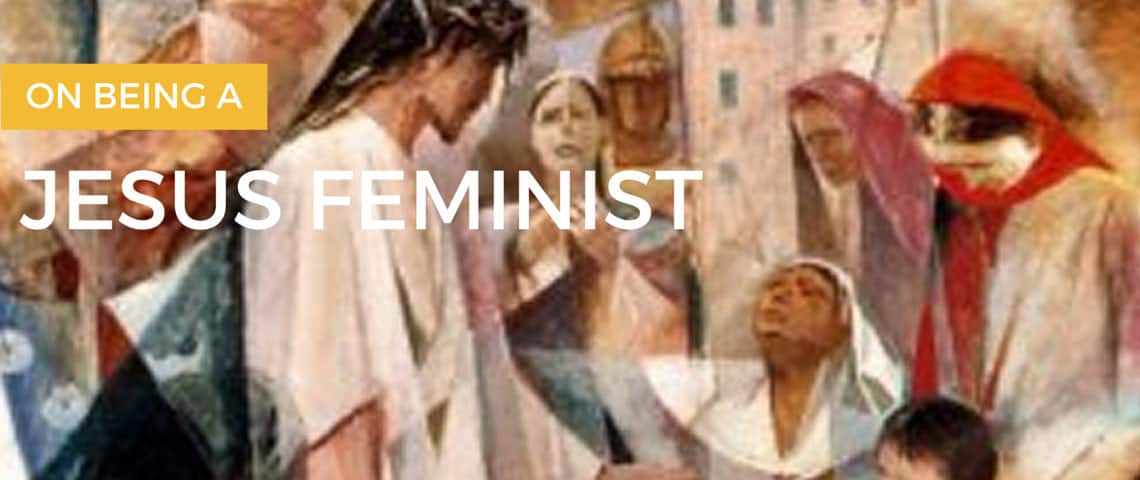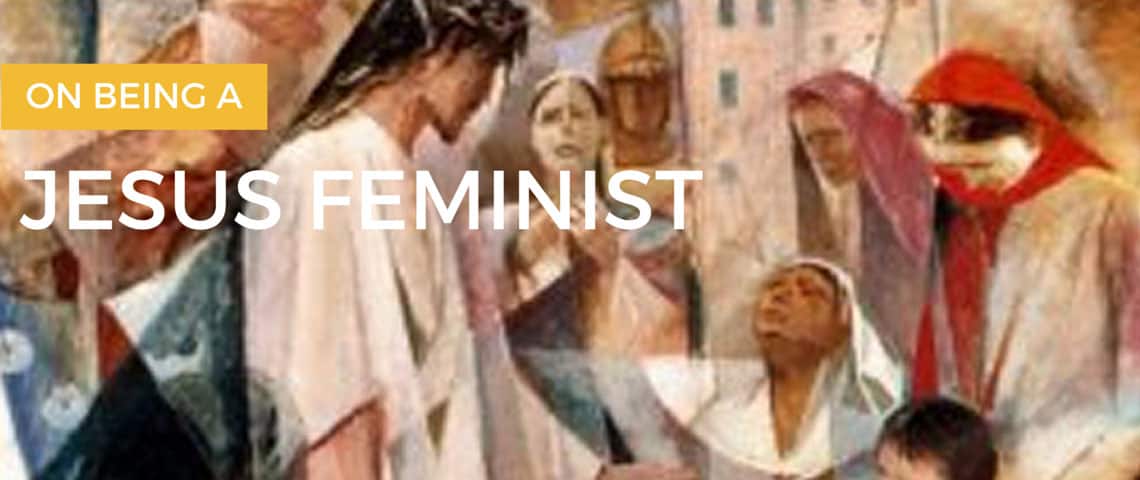Not long ago, for the first time, I used the word “feminist” to describe myself.
Not because something radical has changed about what I believe about women and men, but because I’ve realized that I’m no longer interested in hiding from a word in order to avoid other people’s ideas about that word.
Of course, it’s not quite fair to say that nothing has changed.
I listened to classmates declare that they have gotten “Him’d” out of male depictions for God. I announced my intention to refer to the Holy Spirit as “she” instead of “he” or “it.” (“You’re one of those people,” responded a friend.)
I realized that I can’t stand words like “brotherhood” to describe the Christian family, and I cringe when a song refers to “men” and means the whole body of Christ. I have even started to wonder about words like “fellowship.” (I’m not a fellow, after all; can I still have fellowship?)
When a popular Christian musician replaced “men” with “saints” in a carol on his Christmas album, I stopped rolling out pie crust to share my excitement with my husband.
“Did you hear that? Let saints their songs employ! Saints, not just men!”
I have started to read blogs of women like Rachel Held Evans and Sarah Bessey, women who claim “feminist” as a description for them, too. Several months ago, I encountered Bessey’s book, Jesus Feminist. She writes about how “following Jesus made a feminist out of her.”
Apparently, following Jesus is making a feminist out of me, too.
This newly recognized-and-openly-named feminism keeps popping up at the most inconvenient times, making me wonder if there isn’t a way to shut it off, at least temporarily.
Buying Christmas cards this past year was even more of an ordeal than it usually is. My husband and I have always scoured the cards in order to find ones with art we like, but this year I rejected more than one hopeful because of the message inside. Things like, “May His light shine on you always” or “May He bring peace and love to you” or “Let your hearts be filled with Him so that His grace may be with you now and always.”
I had no idea that Christians had decided it’s okay to replace God with a deified, uppercase He/Him/His. Many of these cards did not even name God, instead offering those capitalized male pronouns as if that communicated the same thing as God’s name.
This woman, this Jesus feminist, this Christian isn’t going to settle for that any more.
I am not going to settle for a Christianity that excludes half the world from full participation. I am not going to settle for a paradigm that lifts up maleness at the exclusion of femaleness. I am not going to settle for a Church that makes God over in our own images.
I am a feminist for women long gone who fought to give me the right to vote, to own property, to speak my voice.
I am a feminist for mothers and grandmothers who raised children in the hope that their daughters might not face the same prejudice they endured.
I am a feminist for the sweet and precious little girls in my life who should not have to live in a world where women are ignored or belittled for no reason but their gender.
I am a feminist for men who respect women and recognize the mutuality of the life we share. I am a feminist for myself, for the voice that God has given me.
I am a feminist for the Church, that it might be the full and vibrant body of Christ in the world.
But aside from all those things, I am a Jesus feminist because my faith compels me to be. Because I believe that Jesus Christ has called men and women to partnership and equality in doing the work of the Gospel.
Let saints their songs employ.
Image Credit: 8th Station of the Cross – Jesus Speaks to the Women of Jerusalem by David O’Connell. O’Connell’s paintings hang on the walls of St. Richard’s Parish, Chichester, U.K. See more here.





6 responses to “On Being a Jesus Feminist”
Interesting use of feminine pronouns for the Holy Spirit. I’ve seen this before and am wondering what your rationale is.
Shimosi,that is a topic we could write a whole series about, and probably should! The author, Beth, may jump in tomorrow with her thoughts, but in the meantime, here is an excerpt from an excellent lengthy articles on the topic. You can access the full article here: http://www.cbeinternational.org/resources/article/does-god-have-gender.
“In Hebrew, “Spirit” (ruah) is grammatically feminine because the word is a metaphor for “wind,” a natural force. Grammatically, God is described by masculine (Greek theos), plural (Hebrew ’Elohim), singular (Hebrew yhwh), feminine (Hebrew ruah), and neuter (Greek pneuma) nouns. These nouns do not tell us about God’s sexuality. They are simply classes or categories of grammatical substantives. God must communicate to us humans within the confines of our own languages. We should learn about God by looking at God’s own explicit self-revelation, and in those self-revelations God clearly tells us that the God of the Bible has no form…
God transcends gender because God is Spirit and has no form, male or female. This is God’s explicit revelation. Therefore, God incarnate, Jesus, as a male does not reflect God’s essence. As we would expect, Jesus does not use “male” for self-description. Masculine biblical language for God, as a consequence, refers to grammatical, not natural, gender.
Even though God transcends gender, God also is the source of all gender. We are like God, as well as unlike God. God is the creator of the world: “the earth, humanity and the animals” (Jer. 27:5, Gen. 1).
Both genders are needed to reflect God’s image.
Conclusions:
First, we should reclaim all the variety of biblical imagery about God that can help us understand God much more. Second, we should keep in mind some dangers: (1) If we overuse “he” for God, we may forget that “he” in the Bible is a generic nonsexual term. (2) If we begin to use “she” for God, we may begin to think that God is a female. (3) If we begin to use “he” and “she” interchangeably for God, some people might understand the terms to refer to two gods, whereas we believe in one God of three equal, completely harmonious persons who can meet all human needs…
People sometimes form an image in their mind for God and, if we challenge that image, to their mind, we commit blasphemy. But they need to remember that God transcends gender, because God is Spirit and has no form, male or female. Jesus’ maleness is not what reflects God’s essence.54 Masculine biblical language for God refers to grammatical, not natural, gender. God is the source of everything, including gender. Therefore, males and females are both needed to reflect God’s image. Consequently, God is identified with a variety of characteristics and culturally gendered roles of both females and males, identifying with both genders. To whom will we compare God, or what likeness will we compare with God? (Isa. 40:18, 25). No one and all. Then, does God have gender or gender identity? Definitely no—God has no sex. God is in God’s own class.”
Thoughts?
Awesome! I also had to rework my understanding of the word ‘feminist’ so that I could fully embrace my stance as a person who believes in full gender equality.
I led a devotional and some singing on Christmas morning, and changed the line to “Let us our songs employ!” It worked fine.
We really need a LIKE button for things like this!